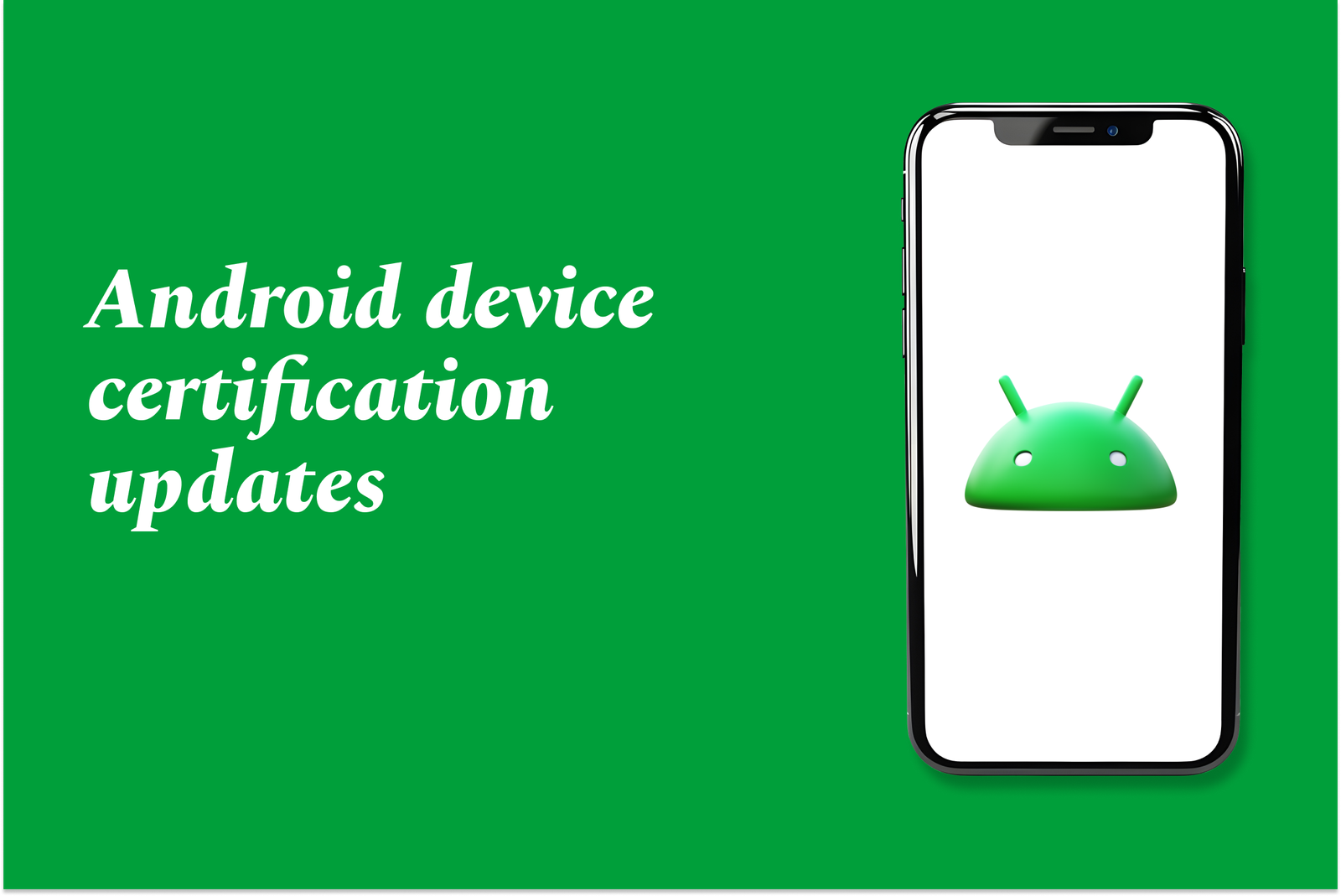Android Device Certification Updates
Android device certification updates ensure devices meet Google’s security, compatibility, and performance standards, enabling safe access to Google apps and Play Store. These updates help maintain device security, app functionality, and support for the latest Android OS versions.
Android Device Certification Updates
1 ) Google Play Protect Certification Overview
Google certifies Android devices to ensure security and compatibility for running Google apps and Play Store applications.
Certified devices undergo hundreds of security and compatibility tests, including Play Protect malware scanning and privacy protections.
Devices must have authentic pre installed Google apps like YouTube, Maps, Gmail, and Chrome.
The certification is symbolized by the Google Play Protect logo, helping consumers identify secure devices.
Uncertified devices may lack basic security features and malfunction with Google apps.
2 ) Microsoft Teams Android Devices Certification and Support Lifecycle
Microsoft Teams Android devices must be certified under Microsoft’s active Certification Programs covering Teams Phones, Teams Rooms, and Panels.
Certification lifecycles are managed by OEM partners; support applies only to certified devices.
Teams app updates follow the Modern Lifecycle Policy with automatic updates via Teams Admin Center; updates can't be fully disabled but may be deferred for up to 60 days.
Supported Teams app versions include the latest and the immediately previous version for stability and security.
Supported Android OS versions for Teams devices align with Google’s support cycles.
HP Poly’s Teams Rooms devices exemplify the transition to advanced Android versions:
First generation (2019 2021 ) run Android 10.
Second generation (2023 ) run Android 13, offering longer certification support.
Android 10 devices will lose certification support after September 2025 but will continue to function.
Microsoft commits to supporting certified devices with security and feature updates as long as OEMs maintain certification compliance.
3 ) Certificate Update Issues on Android Email Devices
Recent issues reported where renewing a GoDaddy SSL certificate on Exchange 2019 caused Android devices to stop receiving mail, while iPhones and PC Outlook remained unaffected.
Rolling back to the old revoked certificate temporarily restored Android email functionality but broke other devices.
Troubleshooting discussed includes checking certificate installation locations, name coverage within certificates, internal and external DNS records.
The issue highlights the sensitivity of Android mail clients to SSL certificate configuration and the importance of consistent server certificate management.
4 ) General Device Certification and Security Practices
Manufacturers globally can pre install Google apps only on certified, secure devices.
Certification involves adherence to Android security models, recent software updates, and zero tolerance for pre installed malware.
Certification is essential for device support lifecycle and ensuring apps perform correctly.
Consumers and enterprises are advised to seek devices with Play Protect certification for assured security and compliance.
Summary:
Android device certification programs from Google and Microsoft ensure devices meet stringent security, app compatibility, and feature standards. Google Play Protect certification establishes a trusted baseline for Android devices running Google apps, while Microsoft's Teams Android certification focuses on delivering a high quality experiences through lifecycle managed updates and OS support, with a notable transition from Android 10 to Android 13 for improved longevity. Security certificate management is critical, as demonstrated by mail issues on Android devices following Exchange SSL certificate renewal, underscoring the importance of consistent device and server certification compliance to maintain secure functionality.
https://justacademy.in/news-detail/android-social-media-app-updates
https://justacademy.in/news-detail/latest-android-camera-app-innovations
https://justacademy.in/news-detail/flutter-web-performance-benchmarks
https://justacademy.in/news-detail/dart-pub-trends-in-2025
https://justacademy.in/news-detail/flutter-devrel-team-news
Related Posts
Java supports GDPR and data privacy by enabling secure data handling through encryption, controlled access, and precise data management. It allows developers to minimize PII exposure, ensure data confidentiality, and design workflows that comply with data protection regulations effectively.
Java code quality tools have evolved to include advanced static analysis, integrated security checks, and AI-powered code reviews. These updates help developers detect bugs, enforce coding standards, and enhance security, streamlining the development process and improving overall code reliability.
Java remains a cornerstone in big tech companies, evolving with modern features like records, pattern matching, and virtual threads. Its robust ecosystem, enhanced performance, and growing AI integrations keep it vital for both legacy systems and innovative new projects.
Java and CI/CD pipeline optimizations streamline Java application development by automating builds, tests, and deployments. They improve efficiency through parallelization, caching, and secure secrets management, enabling faster feedback loops and more reliable, scalable software delivery.
Java supports modern cryptography standards through its flexible Java Cryptography Architecture (JCA), enabling integration of advanced algorithms like AES, EdDSA, and post-quantum tools. Libraries like Bouncy Castle offer FIPS-certified, hardware-accelerated implementations for secure development.
Java 23 enhances record patterns by enabling concise, direct destructuring of record components within pattern matching, simplifying type checks and data extraction. This improvement boosts code readability and expressiveness by reducing boilerplate in handling immutable data classes.
Java remains a top choice for mobile app backends, powering scalable, secure, and high-performance server-side solutions. Latest trends include cloud-native microservices, reactive programming, and enhanced JVM optimizations, enabling efficient, flexible, and robust mobile backend development.
Java SE 24 and LTS Java SE 21 offer enhanced features and performance, while Apache Spark 4.0.0 introduces Scala 2.13 support and advanced ML and SQL capabilities. Together, they empower developers to build scalable, high-performance data applications with modern tools.
JUnit 5 modernizes Java testing with a modular architecture, improved assertions, and seamless Java 8+ support. Beyond JUnit, tools like Mockito and AssertJ enhance mocking and assertions, creating a powerful, flexible ecosystem for writing clean, efficient Java unit tests.
Java plays a pivotal role in cloud automation tools by providing a robust, platform-independent language used to build scalable automation frameworks like Jenkins and Selenium, enabling efficient CI/CD pipelines, testing, and orchestration across diverse cloud environments.










